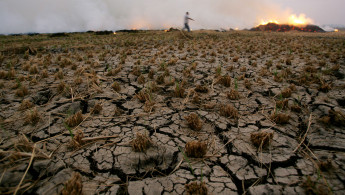NASA: Middle East experienced worst drought in 900 years
A drought which lasted from 1998 to 2012 in the eastern Levant region was likely the worst in 900 years, according to a new report from NASA’s Goddard Institute for Space Studies.
Scientists studied tree rings in the region that includes Turkey, Syria, Jordan, Lebanon, Palestine and Israel, a found that the worst droughts were exacerbated by human-induced climate change.
"The magnitude and significance of human climate change requires us to really understand the full range of natural climate variability," said Ben Cook, a climate scientist at the Goddard Institute for Space Studies.
"If we look at recent events and we start to see anomalies that are outside this range of natural variability, then we can say with some confidence that it looks like this particular event or this series of events had some kind of human caused climate change contribution," he said.
According to cook, the region's recent drought, which lasted from 1998 to 2012, was not only 50 percent drier than any period in the last 500 years, but was also 10-20 percent drier than any drought since 1100.
Experts also believe that the region is set to face further problems with drought in the future.
"The Mediterranean is one of the areas that is unanimously projected [in climate models] as going to dry in the future," Yochanan Kushnir, a climate scientist at Lamont Doherty Earth Observatory who was not involved in the research, said in a statement.
"This paper shows that the behavior during this recent drought period is different than what we see in the rest of the record."
The findings of this report, which are published in the Journal of Geophysichal Research, highlight the magnitude of the recent drought, which some researchers believe was one of the underlying causes of Syria's civil war.
According to a report published by the World Resources Institute [WRI] in 2015, "Drought and water shortages in Syria likely contributed to the unrest that stoked the country's current civil war. Dwindling water resources and chronic mismanagement forced 1.5 million people, primarily farmers and herders, to lose their livelihoods and leave their land, move to urban areas, and magnify Syria's general destabilisation".
The report by the WRI also projected that 33 countries will face "extremely high" water stress levels, 14 of whom are Middle Eastern nations.





 Follow the Middle East's top stories in English at The New Arab on Google News
Follow the Middle East's top stories in English at The New Arab on Google News
![Netanyahu furiously denounced the ICC [Getty]](/sites/default/files/styles/image_330x185/public/2024-11/GettyImages-2169352575.jpg?h=199d8c1f&itok=-vRiruf5)
![Both Hamas and the Palestinian Authority welcomed the ICC arrest warrants [Getty]](/sites/default/files/styles/image_330x185/public/2024-11/GettyImages-2178351173.jpg?h=199d8c1f&itok=TV858iVg)
